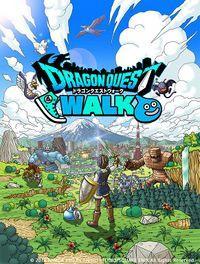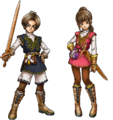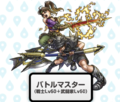Dragon Quest Walk: Difference between revisions
Antiyonder (talk | contribs) No edit summary |
No edit summary |
||
| Line 23: | Line 23: | ||
The game uses a GPS location system to map the player's location in Japan to it's equivalent within itself, carrying over famous landmarks such as Tokyo Tower if in the player's proximity. After selecting a quest to complete the player must physically travel to the destination in order to complete the task, but the game scale's the world map to the player's location and allows them to pick a closer location for an adventure. Quests range from recovering specific items to give to important [[Non-Player Character|NPC]]s to defeating monsters. | The game uses a GPS location system to map the player's location in Japan to it's equivalent within itself, carrying over famous landmarks such as Tokyo Tower if in the player's proximity. After selecting a quest to complete the player must physically travel to the destination in order to complete the task, but the game scale's the world map to the player's location and allows them to pick a closer location for an adventure. Quests range from recovering specific items to give to important [[Non-Player Character|NPC]]s to defeating monsters. | ||
Combat is turn-based as in the series standard, with a monster's actions being shown in third-person and the player's avatar being depicted from behind as they preform an action. Battle is not limited to one-on-one fights, and players can form real life parties to tackle difficult missions together. Basic vocations--[[Warrior]], [[Priest]], [[Martial Artist]], [[Mage]], and [[Thief]]--were available at launch, with advanced vocations being added in the January 28 2020 update including the [[Gladiator]], [[Sage]], and [[Ranger]]. Advanced vocations require mastery of two basic careers in order to unlock, similar to the system seen in ''Dragon Quest VI'', with the ranger requiring the player reach level 50 in the martial artist and thief for example. When exploring dungeons, the camera will shift to a first-person mode and steps will be taken one at a time in-game with random encounters triggering. | Combat is turn-based as in the series standard, with a monster's actions being shown in third-person and the player's avatar being depicted from behind as they preform an action. Battle is not limited to one-on-one fights, and players can form real life parties to tackle difficult missions together. Basic vocations--[[Warrior]], [[Priest]], [[Martial Artist]], [[Mage]], and [[Thief]]--were available at launch, with advanced vocations being added in the January 28 2020 update including the [[Gladiator]], [[Sage]], and [[Ranger]], and yet more occupations being added through later updates. Advanced vocations require mastery of two basic careers in order to unlock, similar to the system seen in ''Dragon Quest VI'', with the ranger requiring the player reach level 50 in the martial artist and thief for example. When exploring dungeons, the camera will shift to a first-person mode and steps will be taken one at a time in-game with random encounters triggering. | ||
Unlike other AR games, ''DQ Walk'' has an actual story that is gradually told to the player through the completion of mainline quests, NPC dialogue in sidequests, and so forth. This storyline includes original characters specifically made for the game, as well as cameos of characters from past titles. Because certain characters had no official artwork for their debut, new art drawn by [[Akira Toriyama]] was prepared for these individuals, such as [[Rose]] for example. | Unlike other AR games, ''DQ Walk'' has an actual story that is gradually told to the player through the completion of mainline quests, NPC dialogue in sidequests, and so forth. This storyline includes original characters specifically made for the game, as well as cameos of characters from past titles. Because certain characters had no official artwork for their debut, new art drawn by [[Akira Toriyama]] was prepared for these individuals, such as [[Rose]] for example. | ||
| Line 50: | Line 50: | ||
File:Walk rangers.jpg|Promotional image for the ranger vocation | File:Walk rangers.jpg|Promotional image for the ranger vocation | ||
File:Walk sages.jpg|Promotional image for the sage vocation | File:Walk sages.jpg|Promotional image for the sage vocation | ||
File:DQ Walk Armanetalists.jpg|Armamentalist promotion | |||
File:Dragon Quest Walk Paladins.jpg|Paladin promotion | |||
</gallery> | </gallery> | ||
Revision as of 20:52, 28 September 2020
| Spinoff games | |
|---|---|
| Dragon Quest Walk | |
Main artwork depicting the male avatar, Slamichi, and Empyrea | |
| Developer(s) | Square Enix |
| Publisher(s) | Square Enix |
| Platform(s) | Cell phone |
| Release date(s) | JP Sept 12, 2019 |
| Genre(s) | Augmented Reality RPG |
Dragon Quest Walk (ドラゴンクエスト ウォーク Doragon Kuesuto Oaku) is a mobile RPG that utilities augmented reality to transport players into a fusion of the real world with Dragon Quest. Guided by a mysterious voice, the player can complete quests, battle monsters, and establish a home base. Within one week of it's launch, the game was downloaded over five million times and reached more than ten million downloads after two months.
Gameplay
The player is guided by a special slime named Slamichi, who bears a magical compass and serves as the tutorial guide for the player. The game uses a GPS location system to map the player's location in Japan to it's equivalent within itself, carrying over famous landmarks such as Tokyo Tower if in the player's proximity. After selecting a quest to complete the player must physically travel to the destination in order to complete the task, but the game scale's the world map to the player's location and allows them to pick a closer location for an adventure. Quests range from recovering specific items to give to important NPCs to defeating monsters.
Combat is turn-based as in the series standard, with a monster's actions being shown in third-person and the player's avatar being depicted from behind as they preform an action. Battle is not limited to one-on-one fights, and players can form real life parties to tackle difficult missions together. Basic vocations--Warrior, Priest, Martial Artist, Mage, and Thief--were available at launch, with advanced vocations being added in the January 28 2020 update including the Gladiator, Sage, and Ranger, and yet more occupations being added through later updates. Advanced vocations require mastery of two basic careers in order to unlock, similar to the system seen in Dragon Quest VI, with the ranger requiring the player reach level 50 in the martial artist and thief for example. When exploring dungeons, the camera will shift to a first-person mode and steps will be taken one at a time in-game with random encounters triggering.
Unlike other AR games, DQ Walk has an actual story that is gradually told to the player through the completion of mainline quests, NPC dialogue in sidequests, and so forth. This storyline includes original characters specifically made for the game, as well as cameos of characters from past titles. Because certain characters had no official artwork for their debut, new art drawn by Akira Toriyama was prepared for these individuals, such as Rose for example.
Trivia
- The first-person, step-by-step method of dungeon exploration is a reference to the Ultima game, which were one of the prime inspirations for Dragon Quest.
- The home base feature is similar to the player homes found in Ultima Online, using the same isometric viewpoint.
Videos
The official trailer
English translation provided by a fan
















